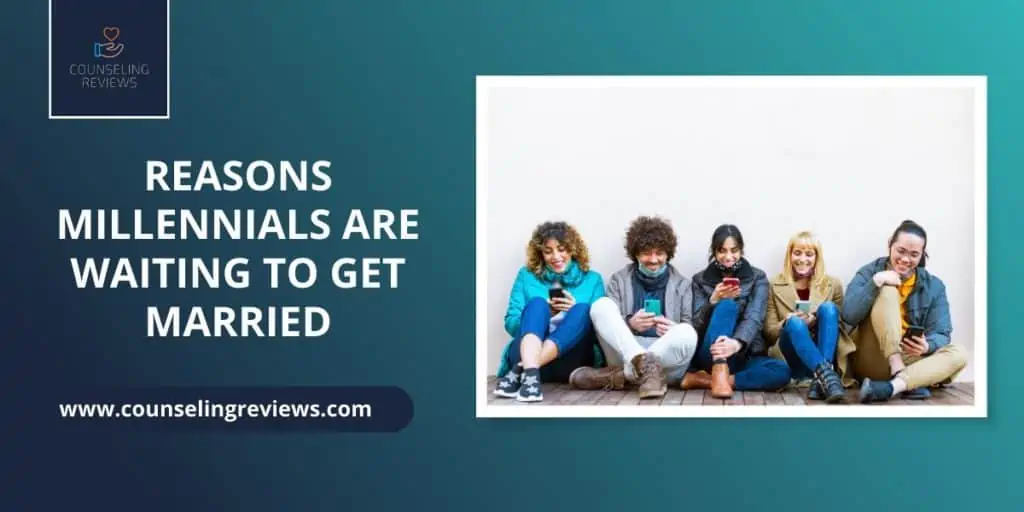In today’s world, millennials are against conventional marriage in unprecedented numbers, and that is not everything. In Western society, at the end of the 18th century, marriage was changed from an economic contract into a union based on love. Now it could be heading towards the same age with a dramatic marital reform.
As many millennials fear separation and are financially overwhelmed, love is becoming vital. That starts to change the definition of marriage. Most millennials settle later in life while they take time to get to know their companion, they cohabitate before legally engaged, earn money, have fewer children and become financially stable.
However, some of them are not getting engaged at all, and the rate of marriage is decreasing.

As more people come together from older generations and diverse cultural or ethnic backgrounds in religious settings, they are more likely to opt for several ceremonies. Yet, that is for the millennials who are waiting longer to marry. The generation is also helping to reduce the marriage rate.
From dating to the first marriages together, here is how millennial marriage evolves.
Millennials Say No to Divorce Rate
Experts have reported that the US divorce rate has been dropping by 24 percent since the 1980s. Millennials are actively bucking the trend of high divorce rates by approaching relationships with caution and foresight. This generation prioritizes avoiding unhealthy connections and is committed to investing time in finding a suitable romantic partner.
They recognize the significance of stabilizing their financial standing before entering into marriage.
This involves a high school education, establishing solid careers and alleviating the burden of student loan debt, ultimately paving the way for more harmonious partnerships with reduced stress levels. As a result, millennials are reshaping the narrative around relationships, valuing quality over speed and taking deliberate steps to build lasting bonds.
Millennials Tie the Knot at a Later Age
Millennials are choosing to marry at a later age compared to earlier generations, often due to a focus on career advancement and the search for compatible partners. Recent data from the US Census Bureau reveals that the average age for a first marriage is 27 for women and 29 for men.
Individuals who have found their suitable life partners are waiting an average of five additional years before tying the knot. This shift reflects the changing priorities and lifestyles of both parents and millennials, who are placing greater emphasis on personal and professional growth before entering into marriage.
Millennials Live Together and Even Buy Homes Before Getting Married
Many couples live together before marriage. Millennials are reshaping relationship norms by opting to cohabit and even invest in homes before tying the knot. This trend is seen as a factor in the declining divorce rates, as living together becomes a crucial path toward building a solid and contented marriage.
In a further departure from tradition, certain couples are choosing to buy properties jointly before formally getting engaged, emphasizing property ownership as a primary focus over marriage. This shift reflects evolving attitudes about matrimony and is significantly influenced by economic realities.
Escalating housing prices have made the division of mortgage payments a pragmatic choice, encouraging couples to explore alternative routes to commitment and shared financial responsibilities.
More Millennials Are Willing to Sign Prenups
Prenuptial agreements, which keep boundaries for the future division of property and financial resources in the case of divorce, are commonly associated with the wealthy and powerful. This practice is hugely prevalent among Americans, especially the millennial generation
Roughly half of the lawyers studied by the American Academy of Marriage Lawyers in 2016 said that prenups increased between millennials, and 62 percent said that prenups were increasing altogether between 2013 and 2016.
It explains more how millennials tend to be afraid of divorce, and later marriage. Many millennial marriages are willing to protect their interests, especially in assets and debt they have had more time to obtain before they get married.
Millennials Prefer More Unconventional Weddings
Millennial couples are veering away from conventional wedding norms, opting for more unique and non-traditional approaches. Traditional banquet halls and hotel reception rooms are being swapped for rustic barns and picturesque farms as preferred venues.
This shift could be attributed to the fact that many millennials cohabit for extended periods before getting engaged, allowing them to establish their essential household items beforehand.
In line with this trend, there’s a notable change in the realm of wedding gifts. Rather than receiving extravagant physical presents, there’s a rising preference for monetary gifts and contributions to “honeymoon funds.” This alteration reflects the changing priorities of this generation, who value experiences and shared memories over accumulating material possessions.
The contemporary millennial approach to weddings showcases a departure from convention, embracing personalization and the celebration of love in their own distinct ways.
The Pull For Independence
The allure of independence is strong among millennials, who believe that happiness doesn’t solely hinge on living with a romantic or partnership. Raised with mantras like “pursue your dreams” and “don’t settle,” individualism, as noted by psychologist Jean Twenge from San Diego State University, plays a central role in deterring millennials from committing to relationships.
Nonetheless, research underscores the advantages of committed partnerships. Dr. John Gottman highlights that cultivating a lifelong bond reaps tangible health benefits and emotional rewards for children. He emphasizes that individuals tend to lead longer lives when engaged in satisfying marital relationships.
Shifting from a lifetime of valuing personal autonomy to prioritizing a serious romantic partner’s needs and embracing compromise might feel unfamiliar. However, for those seeking deep connections, transitioning from a “me” to a “we” mentality can yield profound rewards.
The Impact of Not Getting Married
The American columnist Tom Keane is deeply concerned about the gradual attention of marriage as younger generations are not waiting to be married until they have established themselves well in their careers. The institution that used to be the basis of good seems to have been reduced to an unfortunate reconsideration.
Some think that the lack of a structural system can hurt future social welfare. With its diminishing popularity from previous generations, fewer unions mean less social influence. The reality is that young people want to get married, but they are not able to get married as quickly as previous generations.
Millennials delay marriage rather than completely renounce the institution. Millennials would like to assess their brides before they leap into what is meant to be a lifetime engagement.
For millennials, the goal is to marry their partner by mutual consent and to establish a relationship first and foremost. The fact that fewer millennia choose to marry reflects new social behaviors, which deny the institution traditional marriage as outmoded.
It is time to embrace new thoughts on relationships and family by accepting the end of conventional marriage as society’s most important model.
Currently residing in Arizona, John shares his home with two beloved pets - a very cute dog and a cat. Although they don't always see eye-to-eye, John's furry companions bring him joy and inspiration, serving as a constant reminder of the importance of cultivating meaningful relationships.
With a keen eye for detail and an unwavering commitment to quality, John is a true asset to the counselingreviews.com team. Whether he's writing about the latest research on mental health or offering practical advice for managing stress, John's expertise and insight are always in high demand.
If you're looking for well-researched and informative content that can help you improve your mental and emotional well-being, be sure to check out John's articles on counselingreviews.com. His writing is sure to provide you with the guidance and inspiration you need to overcome life's challenges and achieve your goals.
- Interview with Gary Tucker: Navigating Eco-Anxiety in a Changing Climate - April 15, 2024
- Mental Health in the Age of TikTok: Experts’ Take - April 12, 2024
- Warning Signs of a Troubled Marriage - February 11, 2024




